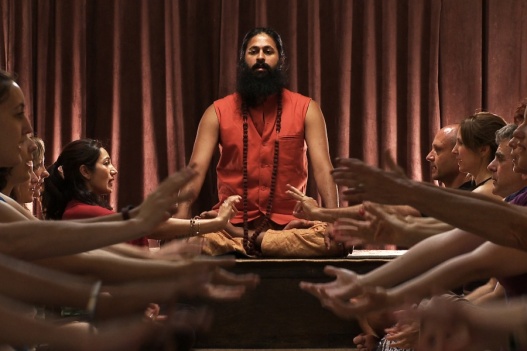If you think about all the tasks, jobs and lessons (and maybe some hair pulling and tantrums thrown in) surrounding the care of a small individual from babyhood until adulthood, it’s easy to see that parenting is no small feat and calling yourself guru might not be so far fetched after all. If you weren’t a guru to begin with, several years into the negotiations over food and briberies over bedtimes, the title is probably well deserved!
Last week I talked about the idea of you as parent being your child’s first guru. The word guru is so loaded with stuff from the culture it comes from as well as media stories of fallen gurus who have not had the interests of their disciples as their primary consideration or have outright taken advantage of their students.
In the amazing film Kumare, the director and actor, Vikram Gandhi, had the idea to explore the idea of the Indian guru that the West has become so infatuated with. What started as an exploration of what makes for a real guru, both Indian and Western, turned into a much more fascinating project where Mr Gandhi decided to don the robes of a guru himself and pose as a real-life guru with a message to spread. If you haven’t experienced the delight that is Kumare, I highly recommend you watch it.
:: Warning, this post contains movie spoilers ::
Kumare was a fake guru who found a real following of students. As a fake guru he felt that he had to be more responsible than ever with the disciples he found for this project. The message of Kumare was that he is just the mirror and that the guru is inside us all. Kumare was simply the mirror to reflect back to the individual what was there all along. While in the film you see Mr Gandhi having fun as Kumare the kooky Indian guru, you also see him taking this role very seriously. He was present, available, compassionate and open for all his students. In a way, because Mr Gandhi was inhabiting the facade of Kumare, he was able to leave his own ego out of it and just be completely present with the needs and desires of the students he was working with. Because he knew he was part of one big lie, he was beyond careful in his approach.
What we see in the movie is that the students went through a very real journey of self discovery, many revealed qualities in themselves that they didn’t know were there. They attributed these moments of growth to Kumare, because he came in the shape of the guru they were seeking. As the audience who are in on the big facade, it’s fascinating to see the very real effect on the students of simply having a present and caring person to listen and guide. Mr Gandhi refers to this in an article as the Spiritual Placebo Effect.
So what has this all got to do with parenting? In looking at our role as being our child’s first guru, we can learn from the movie that a person’s truth and strength already lies within them. Sometimes a person needs an external guru, that comes in the shape of a trusted authority, to reflect back to them what already exists within. In the case of your child, they already see you as the authority figure in their lives. You are in fact the authority figure in their lives. You brought them into the world, you care and nurture them, you are the secure base from which they explore and discover the world. As their parent, you are the primary external guru for your child who will reflect back to them their hopes and dreams as they discover their own internal guru.
When you think the power of the Spiritual Placebo Effect on Kumare’s followers, the absolute conviction in which they attributed their personal growth to their guru, you can see the importance of having a worthy person in the seat of the guru. We learn from Kumare the importance of being present, to not be distracted, to really be with our children in this crucial role. It is truly our responsibility as parents to embody our role in a way that is worthy of the love and devotion that our children give to us. It is also our responsibility to do the best we can to leave our own egos, expectations, neuroses and baggage behind when we step into our relationship with our children.
This is where the practices of yoga come in. Where we look into what yoga teaches us about our mind, our conditioning, the stories we tell ourselves about ourselves. We become more conscious and deliberate about how we move in the world and how we relate to our children. This is the point where we have the agency to help our children find their feet in the world in a mindful way. In a way that doesn’t just project our own expectations for who we want them, what we want them to achieve or how we expect them to behave.
Do you think the parent’s role is to be the external guru to reflect back to a child their own abilities, hopes and dreams?
© 2015 Sandra Wang theyogaparent.com
